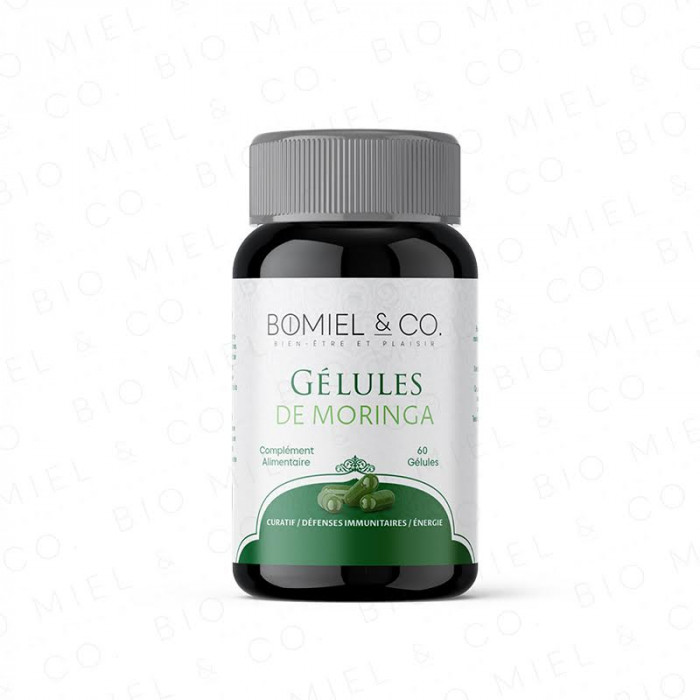- Bio Miel & Co
- 13377 views

Did you know that moringa leaf is a rare plant with exceptional virtues? Its nutrient- and vitamin-rich composition makes this superfood an effective means of regenerating cells, natural sanitation and unclogging arteries. Some NGOs even use it to combat nutritional problems and deficiencies among children in underprivileged countries. Want to find out more? Then let's discover the benefits of moringa together.
What is moringa?
Moringa (Moringa oleifera) is a small tree that grows in tropical and subtropical regions of Asia, Africa and India. It is also known as the Indian nutmeg or pestle tree. Its leaves are widely used as food, medicine and fuel. They have also been used to make a variety of products, including powders and extracts, pills, sprays, cosmetics and soaps.
Moringa leaf is a superfood that has been used for centuries in Ayurvedic medicine. Its medicinal virtues are such that it is said to cure and prevent over three hundred diseases. Prized for its many medicinal virtues, dried moringa leaf is far richer in nutrients than fresh leaf. To reap the benefits of dried moringa leaf by consuming fresh leaf, you'd need twice the quantity. That's why it's best to prefer leaf powder to get the most out of its benefits.
Moringa, an ally against fatigue
If you're experiencing fatigue or a drop in energy, try moringa as a dietary supplement. Rich in mineral vitamins and proteins, you can incorporate it into your diet and make up for nutrient deficiencies. In fact, moringa contains twice as much vitamin C as oranges, as much iron as lentils or meat, twice the calcium and protein of milk, and an astonishing wealth of antioxidants and anti-inflammatories. That's why it's recommended for restoring energy to anemic or deficient people.
Moringa, a source of essential nutrients
Moringa leaves have a high concentration of vitamins, minerals and antioxidants, making them an excellent source of nourishment. They're rich in iron and calcium, which can help your body fight disease. They contain many essential vitamins, including A, B, C and E complex vitamins, niacin and thiamine (B1). These vitamins help keep your skin healthy and strengthen your immune system.
High levels of vitamin K help prevent blood clotting that can lead to heart attacks or strokes in older people whose hearts are already weakened by other causes such as high blood pressure or diabetes.
Rich in magnesium and potassium, they help protect your cells from damage caused by free radicals produced by aging or poor nutrition during pregnancy or infancy (when babies are fed formula instead of breast milk). Free radicals can cause cellular damage that leads to cancer or chronic disease later in life, when they are greater than can be repaired by natural means.
Moringa's wealth of nutrients never ceases to amaze science. According to a study published in the Asian Pacific Journal of Cancer Prevention, moringa contains essential amino acids, carotenoid phyto-nutrients, antioxidants, and natural antibacterial compounds with anti-inflammatory-like function. It also contains three times more potassium than bananas, all the essential amino acids, which is exceptional for a plant, fatty acids that help preserve the cardiovascular system,
Moringa, a detox booster
Rich in chlorophyll, the pigment that colors leaves green, moringa oleifera leaves possess a purifying action. Their detoxifying effect helps eliminate the bacteria responsible for bloating and restores intestinal flora, thus combating candidiasis and mycosis, which are often the cause of intestinal discomfort. In fact, they contain the antioxidant caffeoylquinic acid, which aids digestion by stimulating bile secretion and toxin elimination. It cleanses the liver and kidneys while protecting them from damage. Its high riboflavin concentration gives it an anti-fattening effect, making this superfood a weight-loss ally.
Moringa: benefits and dosage
Because of its nutrient concentration, moringa is used in poor countries as a food to combat nutritional deficiencies. From then on, it is cooked like a young spinach shoot to be eaten as couscous in Africa or soup in the Philippines.
To boost your energy, take one to two teaspoons a day. If you want to take advantage of its anti-inflammatory properties, take two to four teaspoons a day. As an infusion, one teaspoon is enough for one cup. You can drink it several times a day, if you feel the need. You can also turn to moringa capsules, if this suits you better. In that case, take two to six capsules a day.
Related products
